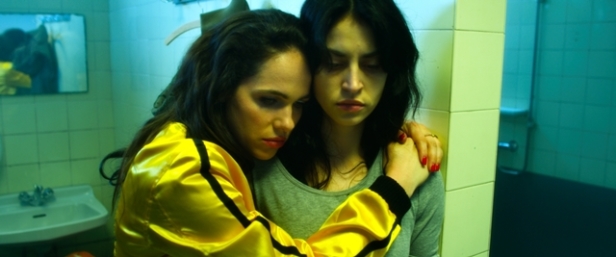“Are you nuts? You’ve got lung cancer,” Özge Dogruol (Violetta Schurawlow) tells the elderly, coughing hospital patient who has just asked her for a cigarette
“No, the cancer’s got me,” insists the old woman. “I doubt the bastard will outlive me. It’s all about how you look at it, you know.”
Özge is in hospital for a different reason, but for her, the real cancer is patriarchal misogyny – and though it has her in its grip, and she must live – possibly even die – with it, she is not the sort to take it lying down. A taxi driver in Vienna by night, and a brutal Thai boxer in her free time, when Özge gets hassle from men, which is often, she hits back and takes them down. Her bright yellow jacket, reminiscent of the clothing worn by Uma Thurman’s Bride in the Kill Bill films, is a vivid signifier of her resourcefulness, her recalcitrance and her driven vindictiveness. So when she witnesses the aftermath of a woman’s vicious murder at the hands – and knife, and boiling oil – of a serial killer, and finds herself next on his target list, she may be in a typical thriller scenario, but she very atypically refuses to play the victim.
Both the writer Martin Ambrosch and the director Stefan Ruzowitsky – who has previously helmed, amongst others, Anatomy (2000) and Deadfall (2012), – may be male, but Cold Hell (Die Hölle) is a defiantly feminist film. Its protagonist is Austria’s answer to Lisbeth Salander, and her long-term exposure to male abuse, beginning in the Turkish home and extending onto the Viennese streets, has hardened her into a taciturn, no-nonsense coiled spring of indignation. Ranged against her is not just a woman-hating pattern killer, but all manner of other daily threats to her person, simply because of her sex, her race and her religion. And if she is slow to trust investigating police detective Christian Steiner (Tobias Moretti) who, slowly and in his gruff way, is the only one to help her, Steiner too comes with his own troubled home life and trust issues. Meanwhile there is the question of what the future holds for Ada, Özge’s niece, whose mother, in a case of mistaken identity, has been another casualty of the killer.
Questions about the future are key to Cold Hell, which uses its thriller tropes to explore the troubled status of second- or third-generation Turkish immigrants like Özge who still struggle to find acceptance as Austrians, while it also teases out the tensions between – and within – the different religions and sexes that form Austrian society. Perhaps, in the end, there is a space where someone like Özge can relax, let down her guard, even almost smile – but that space, in this downbeat, noirish film, would appear to be very narrow.
